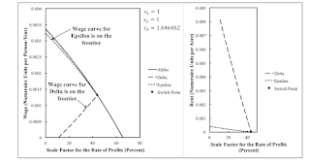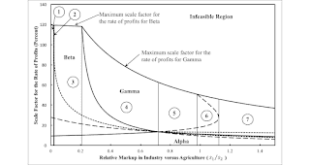We compare the conditions of two isolated market systems A and B. Both are equal in size and population figures, the state of technological knowledge, and in natural resources. They differ from one another only in the supply of capital goods, this supply being larger in A than in B. This enjoins that in A many processes of production are employed with which the output is greater per unit of input than with those employed in B. In B one cannot consider the adoption of these processes on...
Read More »A Three-Technique Pattern With Intensive Rent And Markup Pricing
Figure 1: Wage Curves and Rent for an Example of Intensive Rent1.0 Introduction This post is one in a series exploring variations of an example from Antonio D'Agata (1983). This post demonstrates that at least one of my fluke cases can appear in a model of intensive rent by varying a parameter specifying relative markups among sectors. This post is only a start of exploring the parameter space of relative markups in a specific numeric example of intensive rent. Suppose the rate of...
Read More »Franz Fanon On The Need For People And Leaders To Learn
Optimism of the will leads me to hope that, with the misery we endure and cause, someday some people, including leaders of political movements and parties, will gain some wisdom. As I understand it, Frantz Fanon generalized principally from Algeria. The settler is not simply the man who must be killed. Many members of the mass of colonialists reveal themselves to be much, much nearer to the national struggle than certain sons of the nation. The barriers of blood and race-prejudice are...
Read More »Elsewhere
[embedded content]The First Of A Robert Paul Wolff Series Of Lectures On MarxWolff raises the question of why Marx writes like he does in the first volume of Capital. The rest of Wolff's lectures: Lecture 2 Lecture 3 Lecture 4 Lecture 5 Lecture 6 Lecture 7 Seth Ackerman, in Jacobin, on Marxist crisis theory. Nathan Robinson pans Thomas Sowell. Unlearning Economics disagrees with Sabine Hossenfelder. (Her original video.)
Read More »Marx Against A Simple Labor Theory Of Value
Marx distinguishes, at least, between market prices, prices of production, and labor values. For the first volume of Capital, Marx assumes market prices bob around or tend to labor values, not prices of production. I think Marx nowhere says he is assuming the organic composition of capital does not vary among industries. He adopts the labor theory of value in when considering capitalist production as a whole so as to address the question of how owners of capital are able to regularly obtain...
Read More »Jeremy Rudd: “Why I hate economics”
[embedded content]Jeremy Rudd addresses the Cambridge Society for Economic Pluralism Jeremy Rudd has written: Mainstream economics is replete with ideas that 'everyone knows' to be true, but that are actually arrant nonsense. For example, 'everyone knows' that: aggregate production functions (and aggregate measures of the capital stock) provide a good way to characterize the economy's supply side; over a sufficiently long span - specifically, one that allows necessary price...
Read More »Extensive Rent, Absolute Rent, and Markup Pricing
Figure 1: Variation of Technique with Relative Markups1.0 Introduction This is a rewrite of a previous post with somewhat 'nicer' values for coefficients of production. I also expand on it with some observations on absolute rent. As far as I know, these posts are the first explicit presentation in the post-Sraffian tradition of a model of the prices of production with extensive rent and markup pricing. These posts explore the conflict over distribution among workers, capitalists, and...
Read More »Ludwig Von Mises Being Stupid
Are those who obtain more income better in some way, perhaps more intelligent than others? Are they luckier? According to Ludwig Von Mises, they are superior in intelligence: "The entrepreneur is the agency that prevents the persistence of a state of production unsuitable to fill the most urgent wants of the consumers in the cheapest way. All people are anxious for the best possible satisfaction of their wants and are in this sense striving after the highest profit they can reap. The...
Read More »Some Notes On Marx On Rent
Marx writes about rent extensively in Part II of Theories of Surplus Value and in volume 3 of Capital. I read Theories of Surplus Value decades ago. I have been trying to read the chapters of volume 3 on rent, that is, chapters 37 to 47. In general, these chapters do not use Hegelian terminology, but are just a matter of mathematical economics. Marx conflates analyses I would keep separate. Maybe this is a matter of a dynamic analysis set in historical time. I suppose I do not have...
Read More »Extensive Rent and Markup Pricing In A Complicated Example
Figure 1: Variation of Technique with Relative Markups "That 'diminishing returns' was not an essential element in the surplus-based theory emerged in Marx's criticisms of Ricardo. Sraffa (1960), in his short chapter on land, the implications of which have yet to be developed, shows how the classical view of rents need not necessarily rest on the conception of 'the law of diminishing returns' or need not suggest necessarily any functional relationship between output and cost, or even presume...
Read More » Heterodox
Heterodox



